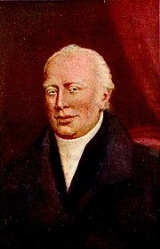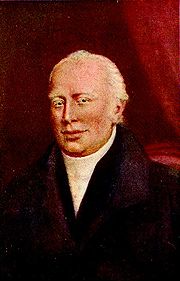
Adam Clarke
Encyclopedia

United Kingdom
The United Kingdom of Great Britain and Northern IrelandIn the United Kingdom and Dependencies, other languages have been officially recognised as legitimate autochthonous languages under the European Charter for Regional or Minority Languages...
Methodist
Methodism
Methodism is a movement of Protestant Christianity represented by a number of denominations and organizations, claiming a total of approximately seventy million adherents worldwide. The movement traces its roots to John Wesley's evangelistic revival movement within Anglicanism. His younger brother...
theologian
Theology
Theology is the systematic and rational study of religion and its influences and of the nature of religious truths, or the learned profession acquired by completing specialized training in religious studies, usually at a university or school of divinity or seminary.-Definition:Augustine of Hippo...
and Biblical
Bible
The Bible refers to any one of the collections of the primary religious texts of Judaism and Christianity. There is no common version of the Bible, as the individual books , their contents and their order vary among denominations...
scholar, born in the townland
Townland
A townland or bally is a small geographical division of land used in Ireland. The townland system is of Gaelic origin—most townlands are believed to pre-date the Norman invasion and most have names derived from the Irish language...
of Moybeg Kirley
Moybeg Kirley
Moybeg Kirley is a townland lying within the civil parish of Kilcronaghan, County Londonderry, Northern Ireland. It lies in the north-west of the parish, with the Moyola River forming its northern boundary. It is bounded by the townlands of Drumconready, Drumcrow, Kirley, Moneyguiggy, and...
near Tobermore
Tobermore
Tobermore is a small village in County Londonderry, Northern Ireland. It is located two and a half miles south of Maghera and five miles west of Magherafelt. Tobermore lies within the civil parish of Kilcronaghan and is part of Magherafelt District Council...
in Ireland
Ireland
Ireland is an island to the northwest of continental Europe. It is the third-largest island in Europe and the twentieth-largest island on Earth...
. He is chiefly remembered for writing a commentary on the Bible which took him 40 years to complete and which was a primary Methodist theological resource for two centuries.
That commentary, published as: "The New Testament
New Testament
The New Testament is the second major division of the Christian biblical canon, the first such division being the much longer Old Testament....
of our Lord and Saviour Jesus Christ. The text carefully printed from the most correct copies of the present Authorized Version. Including the marginal readings and parallel texts. With a Commentary and Critical Notes. Designed as a help to a better understanding of the sacred writings. By Adam Clarke, LL.D. F.S.A. M.R.I.A. With a complete alphabetical index. Royal Octavo Stereotype Edition." [In six volumes of approximately 1,000 pages each] "New York, Published by J. Emory and B. Waugh, for the Methodist Episcopal Church
Methodist Episcopal Church
The Methodist Episcopal Church, sometimes referred to as the M.E. Church, was a development of the first expression of Methodism in the United States. It officially began at the Baltimore Christmas Conference in 1784, with Francis Asbury and Thomas Coke as the first bishops. Through a series of...
, at the conference office, 13 Crosby-Street. J. Collord, Printer. 1831.", may be the most comprehensive commentary on the Bible ever prepared by one man. By himself he produced nearly half as much material as the scores of scholars who collaborated on the twelve-volume The Interpreters’ Bible. His commentary, particularly that on Revelation
Book of Revelation
The Book of Revelation is the final book of the New Testament. The title came into usage from the first word of the book in Koine Greek: apokalupsis, meaning "unveiling" or "revelation"...
, identified the Catholic Church with the antichrist
Antichrist
The term or title antichrist, in Christian theology, refers to a leader who fulfills Biblical prophecies concerning an adversary of Christ, while resembling him in a deceptive manner...
and bordered on antisemitic, as illustrated by the following quote:
“The Jewish philosophyJewish philosophyJewish philosophy , includes all philosophy carried out by Jews, or, in relation to the religion of Judaism. Jewish philosophy, until modern Enlightenment and Emancipation, was pre-occupied with attempts to reconcile coherent new ideas into the tradition of Rabbinic Judaism; thus organizing...
, such as is found the CabalaKabbalahKabbalah/Kabala is a discipline and school of thought concerned with the esoteric aspect of Rabbinic Judaism. It was systematized in 11th-13th century Hachmei Provence and Spain, and again after the Expulsion from Spain, in 16th century Ottoman Palestine...
, Midrashim, and other works, deserves the character of vain deceit, in the fullest sense and meaning of the words. The inspired writers excepted, the JewsJewsThe Jews , also known as the Jewish people, are a nation and ethnoreligious group originating in the Israelites or Hebrews of the Ancient Near East. The Jewish ethnicity, nationality, and religion are strongly interrelated, as Judaism is the traditional faith of the Jewish nation...
have ever been the most puerile, absurd, and ridiculous reasoners in the world. Even RabbiRabbiIn Judaism, a rabbi is a teacher of Torah. This title derives from the Hebrew word רבי , meaning "My Master" , which is the way a student would address a master of Torah...
Maimon or MaimonidesMaimonidesMoses ben-Maimon, called Maimonides and also known as Mūsā ibn Maymūn in Arabic, or Rambam , was a preeminent medieval Jewish philosopher and one of the greatest Torah scholars and physicians of the Middle Ages...
, the most intelligent of them all, is often, in his master-piece, the Moreh Neochim, the teacher of the perplexed, most deplorably empty and vain.” A.C. 1831 VI p. 486
As a theologian, Clarke reinforced the teachings of Methodist founder John Wesley
John Wesley
John Wesley was a Church of England cleric and Christian theologian. Wesley is largely credited, along with his brother Charles Wesley, as founding the Methodist movement which began when he took to open-air preaching in a similar manner to George Whitefield...
. He taught that the Bible provides a complete interpretation of God
God
God is the English name given to a singular being in theistic and deistic religions who is either the sole deity in monotheism, or a single deity in polytheism....
's nature and will. He considered Scripture itself a miracle of God's grace that "takes away the veil of darkness and ignorance." With such an understanding, Clarke was first and foremost a Biblical theologian
Biblical Theology
Biblical theology is a discipline within Christian theology which studies the Bible from the perspective of understanding the progressive history of God revealing Himself to humanity following the Fall and throughout the Old Testament and New Testament...
, often uneasy with purely systematic
Systematic theology
In the context of Christianity, systematic theology is a discipline of Christian theology that attempts to formulate an orderly, rational, and coherent account of the Christian faith and beliefs...
approaches to theology.
Clarke followed Wesley in opposing a Calvinistic
Calvinism
Calvinism is a Protestant theological system and an approach to the Christian life...
scheme of salvation, preferring instead the Wesleyan-Arminian
Arminianism
Arminianism is a school of soteriological thought within Protestant Christianity based on the theological ideas of the Dutch Reformed theologian Jacobus Arminius and his historic followers, the Remonstrants...
positions regarding predestination
Predestination
Predestination, in theology is the doctrine that all events have been willed by God. John Calvin interpreted biblical predestination to mean that God willed eternal damnation for some people and salvation for others...
, prevenient grace
Prevenient grace
Prevenient grace is a Christian theological concept rooted in Augustinian theology. It is embraced primarily by Arminian Christians who are influenced by the theology of Jacob Arminius or John Wesley. Wesley typically referred to it in 18th century language as prevenient grace...
, the offer of justification
Justification (theology)
Rising out of the Protestant Reformation, Justification is the chief article of faith describing God's act of declaring or making a sinner righteous through Christ's atoning sacrifice....
to all persons, the possibility of entire sanctification
Sanctification
Sanctity is an ancient concept widespread among religions, a property of a thing or person sacred or set apart within the religion, from totem poles through temple vessels to days of the week, to a human believer who achieves this state. Sanctification is the act or process of acquiring sanctity,...
, and assurance of salvation.
Perhaps his most controversial position regarded the eternal Sonship
Christology
Christology is the field of study within Christian theology which is primarily concerned with the nature and person of Jesus Christ as recorded in the Canonical gospels and the letters of the New Testament. Primary considerations include the relationship of Jesus' nature and person with the nature...
of Jesus
Jesus
Jesus of Nazareth , commonly referred to as Jesus Christ or simply as Jesus or Christ, is the central figure of Christianity...
. Clarke did not believe it Biblically faithful to affirm this doctrine, maintaining that prior to the Incarnation
Incarnation
Incarnation literally means embodied in flesh or taking on flesh. It refers to the conception and birth of a sentient creature who is the material manifestation of an entity, god or force whose original nature is immaterial....
, Jesus was "unoriginated." Otherwise, according to Clarke, he would be subordinate to God and therefore not fully divine
Divinity
Divinity and divine are broadly applied but loosely defined terms, used variously within different faiths and belief systems — and even by different individuals within a given faith — to refer to some transcendent or transcendental power or deity, or its attributes or manifestations in...
. This was important to Clarke because he felt that Jesus' divinity was crucial to understanding the atonement.
Clarke's view was opposed by many Methodists, notably Richard Watson. Watson and his allies argued that Clarke's position jeopardized the integrity of the doctrine of the Trinity
Trinity
The Christian doctrine of the Trinity defines God as three divine persons : the Father, the Son , and the Holy Spirit. The three persons are distinct yet coexist in unity, and are co-equal, co-eternal and consubstantial . Put another way, the three persons of the Trinity are of one being...
. Clarke's christological view was rejected in large part by Methodist theologians in favor of the traditional perspective.
Resources
- The Christian Prophet and His Work by Adam Clarke (ISBN 0-88019-406-5)
- Christian Theology by Adam Clarke (ISBN 0-88019-261-5)
- Commentary on the Bible by Adam Clarke (ISBN 0-529-10634-5)
- Practical Divinity: Theology in the Wesleyan Tradition (1983) by Thomas Langford (ISBN 0-687-07382-0)
- Adam Clarke, Controversialist: Wesleyanism and the Historic Faith (1975) by Ian Sellers (ISBN 0-900798-08-4)
- When Adam Clarke Preached, People Listened: Studies in the Message and Method of Adam Clarke's Preaching (1981) by Wesley Tracy (ISBN 0-8341-0714-7)
External links
- Some of Clarke's writings - The Life of Adam Clarke, Entire Sanctification, and Adam Clarke's Bible Commentary
- Adam Clarke's O.T. & N.T. Commentary

